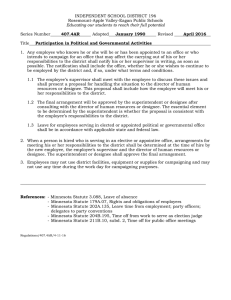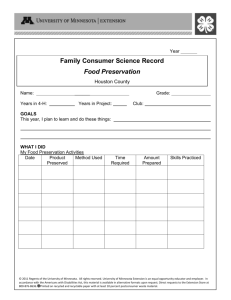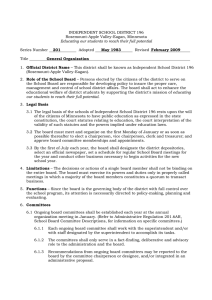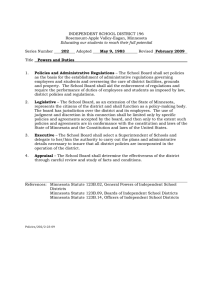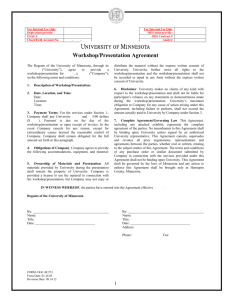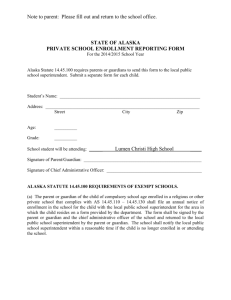INDEPENDENT SCHOOL DISTRICT 196 Rosemount-Apple Valley-Eagan Public Schools Series Number
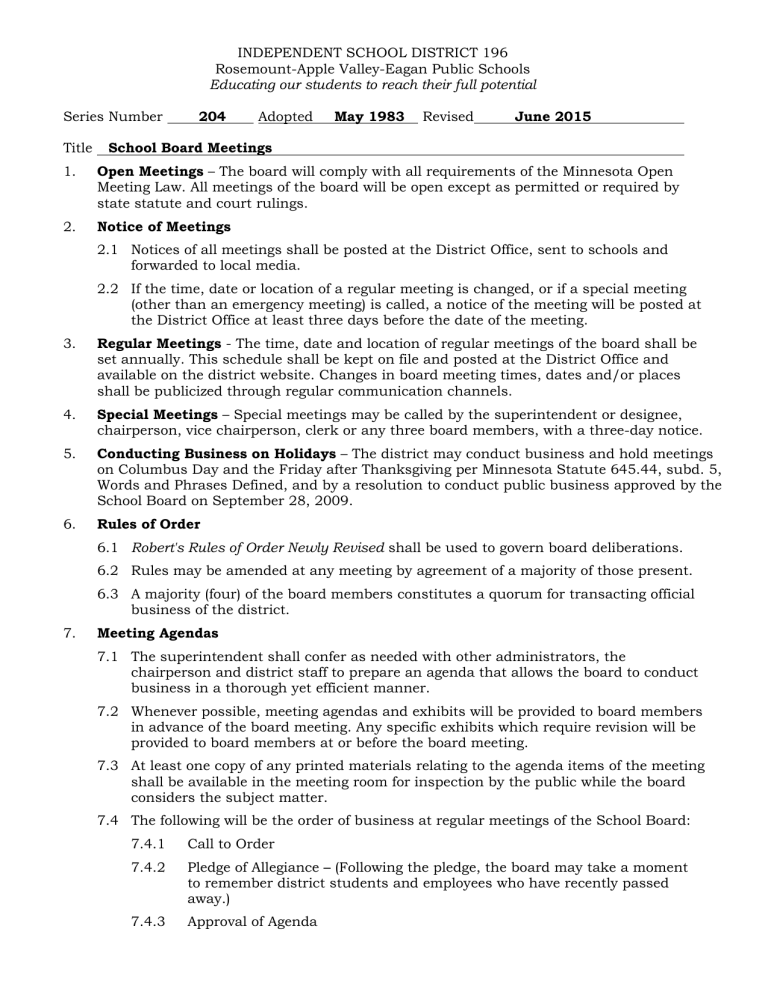
INDEPENDENT SCHOOL DISTRICT 196
Rosemount-Apple Valley-Eagan Public Schools
Educating our students to reach their full potential
Series Number 204 Adopted
Title School Board Meetings
May 1983 Revised June 2015
1.
Open – The board will comply with all requirements of the Minnesota Open
Meeting Law. All meetings of the board will be open except as permitted or required by state statute and court rulings.
2. Notice of Meetings
2.1 Notices of all meetings shall be posted at the District Office, sent to schools and forwarded to local media.
2.2 If the time, date or location of a regular meeting is changed, or if a special meeting
(other than an emergency meeting) is called, a notice of the meeting will be posted at the District Office at least three days before the date of the meeting.
3.
Regular - The time, date and location of regular meetings of the board shall be set annually. This schedule shall be kept on file and posted at the District Office and available on the district website. Changes in board meeting times, dates and/or places shall be publicized through regular communication channels.
4.
Special – Special meetings may be called by the superintendent or designee, chairperson, vice chairperson, clerk or any three board members, with a three-day notice.
5. Conducting Business on Holidays – The district may conduct business and hold meetings on Columbus Day and the Friday after Thanksgiving per Minnesota Statute 645.44, subd. 5,
Words and Phrases Defined, and by a resolution to conduct public business approved by the
School Board on September 28, 2009.
6.
Rules of Order
6.1 Robert's Rules of Order Newly Revised shall be used to govern board deliberations.
6.2 Rules may be amended at any meeting by agreement of a majority of those present.
6.3 A majority (four) of the board members constitutes a quorum for transacting official business of the district.
7.
Meeting
7.1 The superintendent shall confer as needed with other administrators, the chairperson and district staff to prepare an agenda that allows the board to conduct business in a thorough yet efficient manner.
7.2 Whenever possible, meeting agendas and exhibits will be provided to board members in advance of the board meeting. Any specific exhibits which require revision will be provided to board members at or before the board meeting.
7.3 At least one copy of any printed materials relating to the agenda items of the meeting shall be available in the meeting room for inspection by the public while the board considers the subject matter.
7.4 The following will be the order of business at regular meetings of the School Board:
7.4.1 Call to Order
7.4.2 Pledge of Allegiance – (Following the pledge, the board may take a moment to remember district students and employees who have recently passed away.)
7.4.3 Approval of Agenda
Policy 204
Page 2
7.4.3.1 Individual board members may move to revise the agenda by adding a new topic or removing a topic.
7.4.3.2 If the board approves adding a topic to the agenda, that topic will be taken up at the end of the agenda, after Other Action. The addition of a topic to the agenda shall not necessarily result in board action on that topic at that or any other meeting.
7.4.4
Recognition – The board members and superintendent may recognize the special accomplishments or actions of students, staff or community members.
7.4.4.1 The board will publicly recognize students who have:
7.4.4.1.1 Won a state competition or a substantive multi-state competition, or
7.4.4.1.2 Won or placed highly in national or international competition.
7.4.4.2 The board will publicly recognize district employees who have:
7.4.4.2.1 Been chosen to represent the state in a national or international program, or
7.4.4.2.2 Won a state, national or international competitive award.
7.4.4.3 The board may recognize community members who have performed extraordinary service for a school or the school district.
7.4.4.4 The superintendent may recognize staff or students who have an outstanding accomplishment in the community and, if they are in the audience, may ask them to stand and be recognized.
7.4.5 Special Communication Request – Members of the public may address the board for up to five minutes on topics not on the board agenda, excluding complaints about specific district personnel or other individuals. Requests must be submitted in writing to the secretary to the School Board no less than five working days before the board meeting at which they wish to speak. For more information, see Administrative Regulation 204.8AR,
Special Communications Request.
7.4.6 Open Forum – Up to seven people may address the board for up to two minutes each on a topic of their choosing, excluding complaints about specific district personnel or other individuals, by signing up immediately prior to a board meeting.
7.4.7 Consent – Items on the Consent agenda do not require discussion before board action.
7.4.7.1 Any board member may request that any item on the Consent agenda be withdrawn for independent consideration. These items will be moved to the end of the regular agenda, after Other Action and before any new topics added to the agenda under Approval of
Agenda, to be discussed and acted on.
7.4.7.2 Items of Consent are approved en masse by one vote of the board.
7.4.8 Reports – Reports are presented for the information of the board; no board action is required. These include reports from consultants and persons working with district employees and/or programs and district employees.
Policy 204
Page 3
7.4.9 Old Business – Items of Old Business were previously presented to the board as items of New Business that have been brought back for board action.
7.4.10 New Business – Items of New Business require board action at a subsequent board meeting.
7.4.11 Other Action – Items of Other Action are discussed and acted on at the same board meeting.
7.4.12 School Board Member and Superintendent Updates – Board members and the superintendent have the opportunity to comment on topics or events not included on the board agenda.
7.4.13 Adjournment – Meetings shall be adjourned after four hours unless a majority of the board members present agree to continue the meeting.
7.5 The board may depart from the order of business with the consent of the majority of members present.
8. Public Participation at School Board Meetings – Members of the public may participate in regular board meetings during the Special Communication Request and Open Forum portions of the agenda (see sections 7.4.5 and 7.4.6 above), and by addressing items under Reports, Old Business, New Business and Other Action. The chairperson reserves the right to limit the number of people who speak to each agenda item.
9.
Voting Procedure at School Board Meetings
9.1 The majority vote of the board is the legal and official action of that body and should be supported by the members as such. However, a member voting in opposition to the majority has a legal right to have his or her vote recorded in the minutes.
9.2 A roll call vote will be taken if requested by any board member.
10.
Minutes – The minutes of board meetings shall be drafted following the meeting by the secretary to the School Board and approved by board members at the next regular meeting. A summary of the minutes will be published in the district’s official newspaper and on the district’s website.
11. Recording of Meetings
11.1 All regular School Board meetings will be recorded and the recordings retained for one year. Recordings of regular meetings of the School Board will be broadcast on local cable channels and on the district’s website.
11.2 Closed meetings, except those closed as permitted by the attorney-client privilege, must be recorded. Unless otherwise provided by law, the recordings must be preserved for at least three years after the date of the meeting.
11.2.1 Labor negotiations strategy recordings must be preserved for two years after the contract is signed.
11.2.2 Purchase or sale of real or personal property recordings must be preserved for eight years after the date of the meeting. The real or personal property that is the subject of a closed meeting must be specifically identified on the tape.
11.2.3 Security briefings and/or emergency response recordings must be preserved for at least four years. In describing the subject to be discussed at the meeting, the board must refer to the facilities, systems, procedures, services or infrastructures to be considered during the closed meeting.
Policy 204
Page 4
12. Closed Meetings – Before closing a meeting, the School Board shall state on the record the specific grounds permitting the meeting to be closed and describe the subject to be discussed. Closed meetings, except those closed as permitted by the attorney-client privilege, must be recorded.
12.1 Meetings must be closed if the following types of data are discussed:
12.1.1 Data that would identify alleged victims or reporters of criminal sexual conduct, domestic abuse or maltreatment of minor or vulnerable adults;
12.1.2 Educational data, health data, medical data, welfare data or mental health data that are not public data, or
12.1.3 Preliminary consideration of allegations or charges against an individual subject to School Board authority. A meeting must be open at the request of the individual who is the subject of the meeting.
12.2 Meetings may be closed if the following types of data are discussed:
12.2.1 To consider strategy for labor negotiations or developments or discussion and review of labor negotiation proposals;
12.2.2 To evaluate the performance of an individual who shall be identified prior to closing a meeting. At its next open meeting, the board shall summarize its conclusions regarding the evaluation. A meeting must be open at the request of the individual who is the subject of the meeting;
12.2.3 If the closure is expressly authorized by statute or permitted by the attorneyclient privilege;
12.2.4 To determine the asking price for real or personal property to be sold by the government entity;
12.2.5 To review confidential or nonpublic appraisal data;
12.2.6 To develop or consider offers or counteroffers for the purchase or sale of real or personal property, or
12.2.7 To receive security briefings and reports, to discuss issues related to security systems, emergency response procedures, security deficiencies in or recommendations regarding public services, infrastructure and facilities, if disclosure of the information would pose a danger to public safety or compromise security procedures or responses. In describing the subject to be discussed at the closed meeting, the board must refer to the facilities, systems, procedures, services or infrastructures being considered.
References: - Minnesota Statute Chapter 13D, Minnesota Open Meeting Law
Minnesota Statute 123B.09, Boards of Independent School Districts
Minnesota Statute 331A.01, Definitions
Minnesota Statute 645.44, subd. 5, Words and Phrases Defined, Holiday
Resolution to Conduct Public Business, District 196 School Board Meeting,
September 28, 2009 Exhibit D2
Policies/204/6-22-15
